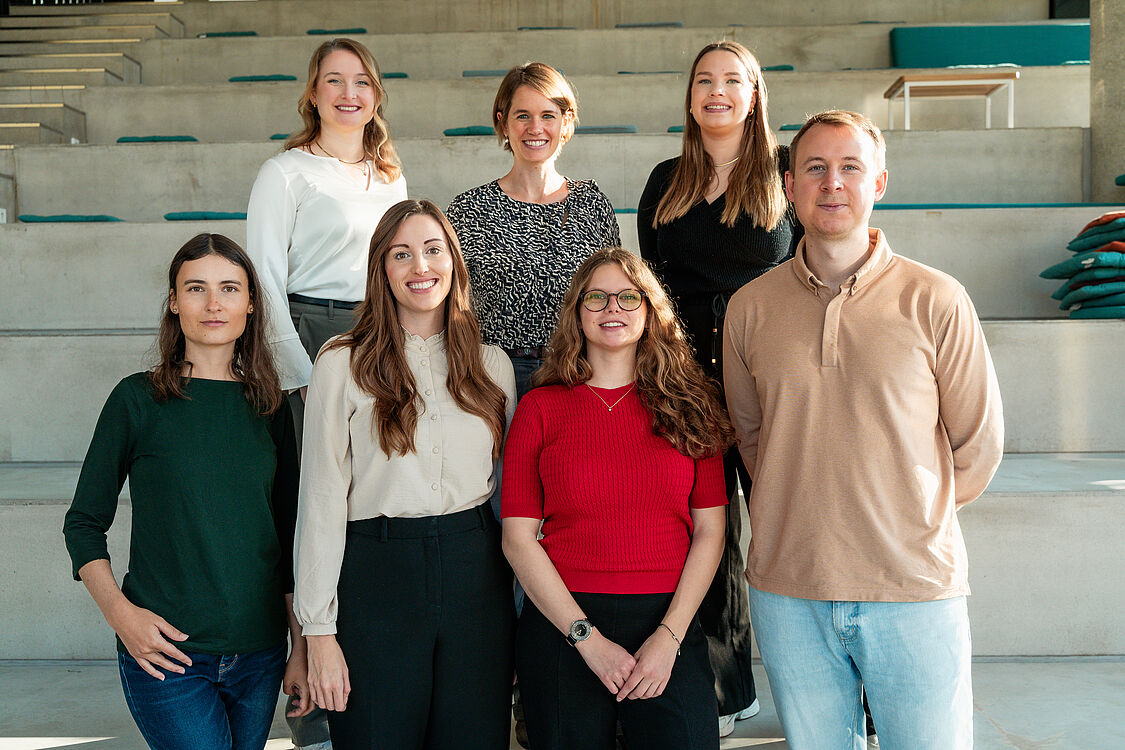Shaping global futures!
In today’s globally connected business world, management activities are influenced by the dynamics of international markets. To support (future) managers and entrepreneurs in dealing with these dynamics, our aim is to provide a better understanding of the implications of internationality for their behavior and decisions. To do so, the professorship’s research and teaching consider, for example, different behavioral tendencies across different cultures, cultural stereotypes, and teamwork across international borders.
We hope you will join one of our courses, seminars, or workshops, and are looking forward to discussing current management challenges and/or recent research findings with you.
Research
The professorship’s research investigates international management focusing on effects of cross-cultural differences, cultural diversity, and team international dispersion, specifically effects on entrepreneurial and innovation behaviors. A central aim is to provide a better understanding of how new ventures can manage international teamwork, innovation, and growth, e.g., considering different cultural behavioral tendencies, cultural stereotypes, and international dispersion requiring remote work and technology interaction. Applied methodologies include qualitative and quantitative approaches, e.g., explorative interviews and observations as well as experiments and surveys. Research projects are interdisciplinary, at the intersection of international management, organizational behavior, entrepreneurship, innovation, leadership, HRM, and HCI. Current projects involve:
- Cross-cultural differences and diversity in entrepreneurial and innovation behavior (e.g., culture driving idea generation vs. idea implementation; cultural diversity influencing innovation behavior; entrepreneurial emotion and cognition)
- Leadership and HRM supporting new venture growth and internationalization (e.g., culture and gender stereotypes in recruitment; organizational experimentation during growth)
- Technology supporting human entrepreneurial behavior (e.g., virtual environments supporting internationally dispersed new venture teams; leadership behaviors in humanoid robots; collaboration with artificial intelligence to support entrepreneurial work)
Teaching
The professorship’s teaching concentrates on the core courses of the international business studies programs, i.e., “International Business” in the Bachelor and “International Management“ in the Master program. The educational activities focus on:
- Action & application: Working on concrete problems, project work in (international) teams, guest lectures by practitioners
- Evidence-based decision-making: Theory-based knowledge transfer, interpretation of scientific findings, participation in and implementation of studies
- International experience: International networking opportunities, experience abroad, integration of language learning
Bachelor
| Course | Semester | ECTS | Language |
| M.IBS.3153 International Business | WS | 10 | ENG |
| M.184.3154 Innovation in Intercultural Virtual Teams | WS | 10 | ENG |
Master
| Course | Semester | ECTS | Language |
| M.IBS.4151 International Comparative Management | SS | 10 | ENG |
We participate in the central assignment procedure for theses. The procedure distributes the students who want to write a thesis fairly among the professorships: For further information click here.
You can suggest topics for your Bachelor's or Master's thesis yourself if they fall within the research area of the professorship (see “Research”), or you can choose one of the following topics:
- Supporting remote work in internationally dispersed startup teams
- Exploring culture stereotypes
- Female entrepreneurs’ international communication behavior
- Entrepreneurship and innovation in Asia
- International Social Entrepreneurship
If you apply for a thesis, please tell us a topic you would like to write about and explain in two to three sentences at most why you are interested in the topic and/or which research methodology (e.g. quantitative survey, case study, interviews, literature review, etc.) you would like to use to work on the topic.
The supervision of the thesis includes (at least) monthly meetings with your supervisor. In these meetings, the topic and the research question, the methods of data collection and data analysis as well as the structure of the thesis are discussed. These meetings can take place online or in person. If you would like to find out more, feel free to contact us (fbudde@mail.uni-paderborn.de).
Team

Cooperation
As part of our academic modules, we offer students the opportunity to gain hands-on experience and apply their theoretical knowledge to real-world projects. Through direct collaboration with start-ups from Paderborn, they can develop their analytical skills and strategic thinking in a practical setting. Among other things, they learn how to enter international markets, design global marketing plans, and adapt business models to different market conditions. For example, in the summer semester of 2024, master's students in the "International Comparative Management" module collaborated with the start-ups coolnis and UFUNDI.
Praxis und Internationalität in der Lehre
Im Rahmen unserer Lehrmodule bieten wir unseren Studierenden die Möglichkeit, praxisnahe Erfahrungen zu sammeln und ihre theoretischen Kenntnisse in realen Projekten anzuwenden.
Durch die direkte Zusammenarbeit mit Start-ups aus Paderborn können Sie Ihre analytischen Fähigkeiten und strategisches Denken in einem praktischen Umfeld erproben. Dabei lernen Sie unter anderem, wie Sie internationale Märkte erschließen, globale Marketingpläne entwerfen und Geschäftsmodelle an verschiedene Marktbedingungen anpassen können.
Im Sommersemester 2024 und 2025 arbeiteten die Masterstudierenden des Moduls "International Comparative Management" beispielsweise mit den Start-ups und etablierten Unternehmen coolnis, UFUNDI, MechConnect sowie TÜV Süd zusammen.

Another example of practice-oriented learning is the “Innovation in Intercultural Virtual Teams” module. Here, students take part in the X-Culture program - an international cooperation project that brings students from all over the world together with companies to solve real business challenges. In intercultural virtual teams, participants develop innovative strategies for companies over a period of around two months. In the process, they gain valuable practical experience and skills in international cooperation and communication.
Praxisorientierte Zusammenarbeit mit dem SINUS-Institut

Im Rahmen des "Modellprojekts zur Verbesserung des Recruitings in KMUs" arbeiten wir in Zusammenarbeit mit dem SINUS-Institut am SINUS-Recruiter. Ziel des Projekts ist es, dem Fachkräftemangel von kleinen und mittleren Unternehmen (KMU) zu begegnen. Zu diesem Zweck werden ein praxisnahes Workshop-Konzept sowie ein leicht anwendbares digitales Tool erprobt, das KMU bei der strategischen Fachkräftesicherung unterstützt und damit zur Stärkung ihrer wirtschaftlichen Resilienz beiträgt. Im Fokus steht dabei weniger das Tool selbst als vielmehr die zugrunde liegende sozial-innovative Methode, die KMU befähigt, ihr Recruiting nachhaltig und zielgruppengerecht weiterzuentwickeln.
Forschungskooperation in Verbindung mit EPICS
Die Professur ist Teil eines internationalen Teams, das durch das Forschungsprojekt "EPICS – Enhancing Productivity of Innovation across Countries for Singapore" entstanden ist. Das Projekt zielte darauf ab zu verstehen, wie kulturelle Unterschiede beeinflussen, inwiefern neu entwickelte Produkte in unterschiedlichen Kulturen unterschiedlich wahrgenommen werden, und inwiefern sie durch unterschiedliche Prozesse entwickelt werden. Mit einem Fokus auf Asien wurden insbesondere Auswirkungen von Unterschieden zwischen Singapur, China, Indien, Indonesien und Japan identifiziert, etwa im Hinblick auf soziale Interaktionen, Risikowahrnehmung und Wertschätzung neuer Ideen und Produkte. Auf Basis der Erkenntnisse des Projekts arbeiten wir an einigen wissenschaftlichen Studien, die aufzeigen, wie interkulturelle Unterschiede und Dynamiken Innovationsverhalten beeinflussen.
We also value practical transfer in research. The “SeeHerTech” project aims to increase the visibility of female entrepreneurs and their innovations in the high-tech sector through scientific studies and practice-oriented transfer measures, such as the development of the digital, AI-based tool “SeeMyTech”, which aims to support women in the development and implementation of their individual communication strategy.











